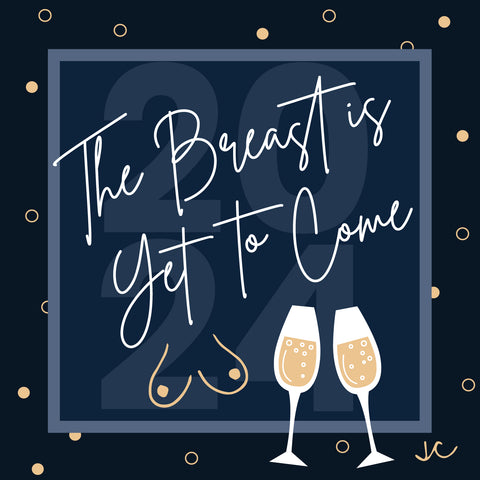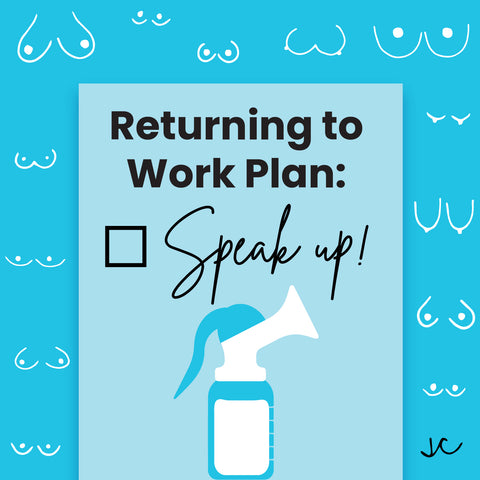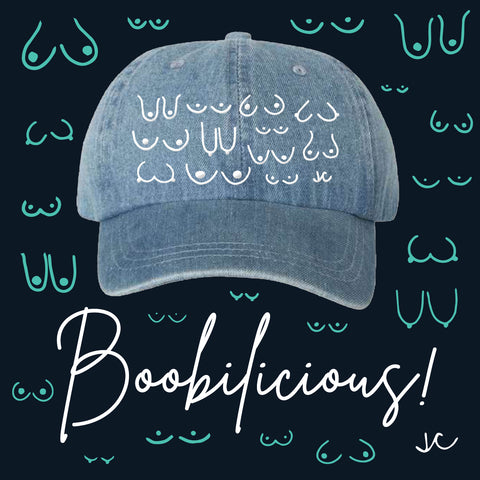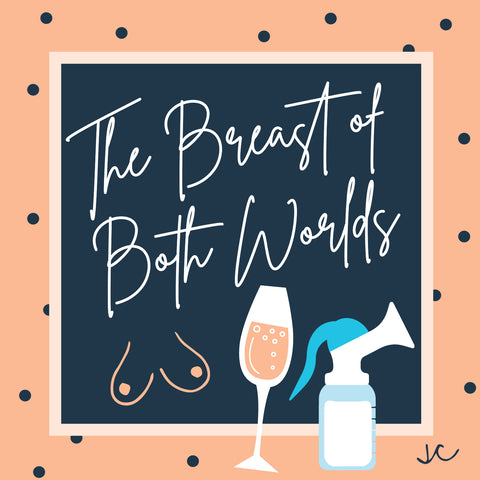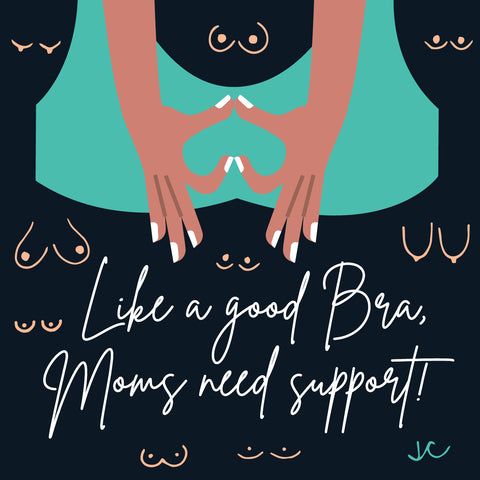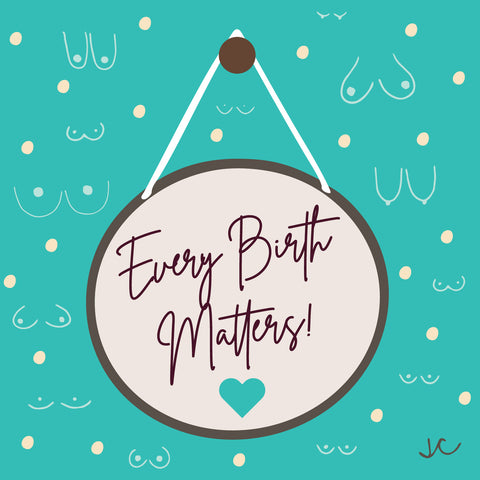Postpartum Period: Your First Period After Baby

Estimated read time: 10 minutes
Whether you’re pregnant or you’ve just given birth, congratulations mama!
One of the things you might be thinking about is when does your period start after giving birth? Your periods have been on a 9-month vacay and that first period after birth (also known as your postpartum period) can be a heck of a lot different to the ones you're used to.
So, what is that first period after baby like, and how will it be different from what you’re used to?
As usual, your Breasties at Titty City Design are here to give you all the facts and info you need so you can relax and prepare yourself for Aunt Flo’s imminent arrival.
Postpartum period after giving birth
Out of all the things you enjoyed throughout your pregnancy, not having to worry about your period was probably high up on that list.
And although your first period after giving birth might come as a bit of a shock to the system, every new mama’s experience is different, so don’t be surprised or alarmed if your period takes longer or takes its time to come.
Every postpartum journey is different.
Before getting into periods after birth, in the first few days after the arrival of your sweet little munchkin, you’ll experience something called lochia. This is the normal discharge from your uterus after giving birth and it consists of blood, mucus, uterine tissue, and other materials from your womb.
This is a normal part of recovery from childbirth and is why you’ll need a ton of maternity pads to line your panties. Some women with c-section deliveries might experience a heavier loss, as, unlike a vaginal birth, the materials in your womb wouldn’t have been removed through pushing.
How long does lochia last? Usually, up to 6 to 8 weeks postpartum, but the color and the amount of lochia lessens over time, going from very heavy and red to light and pink. You might also have clots in the early days post-birth, which can range in size.
Although this isn’t your first period after birth, it helps your body and mind prepare for when your first true period shows up a few weeks later.
When does your period start after giving birth?
Your first period can start around the time your lochia ends, although if you’re breastfeeding, it can take much longer (we’ll get into that in a sec).
If you find your lochia has lessened or almost gone and you then experience a return of bleeding, this is most likely your period.
You can tell the difference between the lochia and your period in a couple of different ways:
- Lochia is only heavy and red during the first week or two after giving birth and then becomes lighter and more watery
- Lochia can increase with activity or exertion and decrease when you rest
- Lochia normally has a distinct, almost sweet smell, which is different from the smell of your period
If you’re not breastfeeding, your period could return about 6 to 12 weeks after giving birth, but it can be as soon as 4 weeks. If you’re exclusively breastfeeding, it can take a lot longer, and we’ll look more closely at this later.
If you’re combi-feeding (breast and bottle) you’ll most likely get your first period somewhere from 6 to 12 weeks.
And if you used to have a regular cycle before pregnancy, this can also change in the postpartum months. It can take a while for your cycle to regulate, and you might find you even skip a cycle or 2, and then experience 2 periods pretty close together.
Don’t worry mama, it takes time for your body to get back to normal.
What will your first period after birth be like?
OK, so now comes the time to tell you what to expect when you get your first period after baby.
When your first postpartum period arrives, there’s a good chance your flow could be different from what you’re used to. It could be lighter, heavier, shorter, or longer. Even the blood might be a different color and texture.
But a lot of women find their first period after birth is heavier than normal. Even with the lochia you experienced, there’s extra blood and uterine lining that needs to be shed, and, brace yourself, it can be more painful too.
If you’re soaking through one pad within a couple of hours, see big blood clots, develop severe headaches, have trouble breathing, spike a fever, or bleed for longer than 7 days, then it’s a good idea to speak to your doctor, just to make sure everything has settled down as it should.
You might want to track your cycle after giving birth to monitor the changes. That way you have a record to hand in case you need to see a doctor (or even remember what it was like if you decide to have another baby).
Just remember that your periods won’t always be like this. Your body has been through a lot and it takes time to readjust and get back to (your version) of normal.
What will period cramps after giving birth be like?
So cramping might be stronger or even lighter than usual.
After giving birth it is possible that there will be an increased intensity of uterine cramping during your postpartum periods. Since the uterine cavity was stretched during pregnancy, there will be more uterine lining to be shed during menstruation which can create more intense period pains.
Hormones from breastfeeding also play a part in cramping as well.
How to reduce postpartum period cramps
If you are looking for a drug-free way to get rid of period pains, we found a wearable patch that works surprisingly well called, Jovi. It is a reusable patch that works on menstrual cramps, backaches, sore muscles, and headaches.
The Jovi patch detects, reroutes, and absorbs signals of discomfort from within the body to significantly alleviate discomfort caused by menstrual cramps through a patented neuro capacitive coupling technology. It has a money-back – guarantee which is why we tried it. And you know what? It worked.
When do you get your period after birth while breastfeeding?
If you’re breastfeeding your little milk monster, then you might notice it’s taking slightly longer for your period to return after giving birth.
Don’t worry mama, that’s completely normal.
It’s all to do with hormones. Prolactin, the hormone needed to produce your magical liquid gold breast milk, can actually suppress your reproductive hormones. This means your body doesn’t ovulate, so you won’t get your period.
However, if you want to hop back in the sack, don’t think you can skimp on birth control (unless you want to get pregnant again right away). It’s still possible to get pregnant while you’re breastfeeding, so you might want to have a conversation about what birth control is best for you.
It can be difficult to predict when your period will return while breastfeeding, especially if you’re exclusively breastfeeding. Most breastfeeding mamas will resume their periods between 9 and 18 months after giving birth. Weaning can trigger your periods to return gradually as you won’t be producing as much prolactin.
It’s also worth knowing that your postpartum periods can affect your breast milk supply. It can dip a little during your period, so you might be in for a bit of cluster feeding fun. Fun fact – it can also affect the taste of your breastmilk! Your baby probably won’t notice the difference though, so don’t worry.
Can you get pregnant before you have a period?
Yep! You can!
You won’t get an advance warning that Aunt Flo’s on her way, and you typically ovulate 2 weeks before your first period. So you might be fertile and ready to go without even knowing it.
Welp!
So, if you’re not ready to get pregnant again, speak to your doctor about your birth control options. There are a ton of different options available, from hormonal to non-hormonal, so even if you’re breastfeeding, you’ll be covered.
That first postpartum period is a doozy
So be kind to yourself mama.
You’ve just grown and birthed a beautiful human and are doing such an amazing job. The return of your menstrual cycle after having a baby can feel like a real shock to the system, but over time, it will settle and start to feel familiar again. Always listen to your body and play it safe and reach out to your doctor if something doesn’t feel right.
You’re strong as a mother Breastie, and we’re so proud of you.
At Titty City Design, we believe that every boobie is beautiful, and that should be celebrated. We are a female-owned and operated, small business here to spread self-love and body positivity with our line of boob apparel, boob accessories, and boob-themed decor and products for the home. A portion of our proceeds goes to help support postpartum people and breast cancer patients.
Products that New Moms Love


